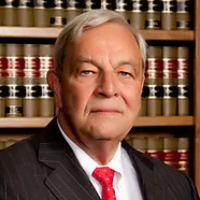Salado Misdemeanor Lawyer, Arkansas
Not enough matches for Salado Misdemeanor lawyer.
Below are all Salado lawyers.
H. David Blair
✓ VERIFIEDAccident & Injury
H. David Blair is a practicing attorney in Arkansas specializing in accident and injury cases. David Blair completed legal studies at University of A... (more)
Laura Wood Brissey
Motor Vehicle, Divorce & Family Law, Criminal, Bankruptcy & Debt
Status: In Good Standing Licensed: 23 Years
Gary M. Vinson
Lawsuit & Dispute, Criminal, Civil & Human Rights
Status: In Good Standing Licensed: 50 Years
Gary M. Vinson
Lawsuit & Dispute, Criminal, Civil & Human Rights
Status: In Good Standing Licensed: 50 Years
Barrett Moore
Accident & Injury, Divorce & Family Law, Criminal, Business, US Courts
Status: In Good Standing
Randall W. Henley
Real Estate, Child Custody, Divorce & Family Law, Criminal
Status: In Good Standing Licensed: 42 Years


